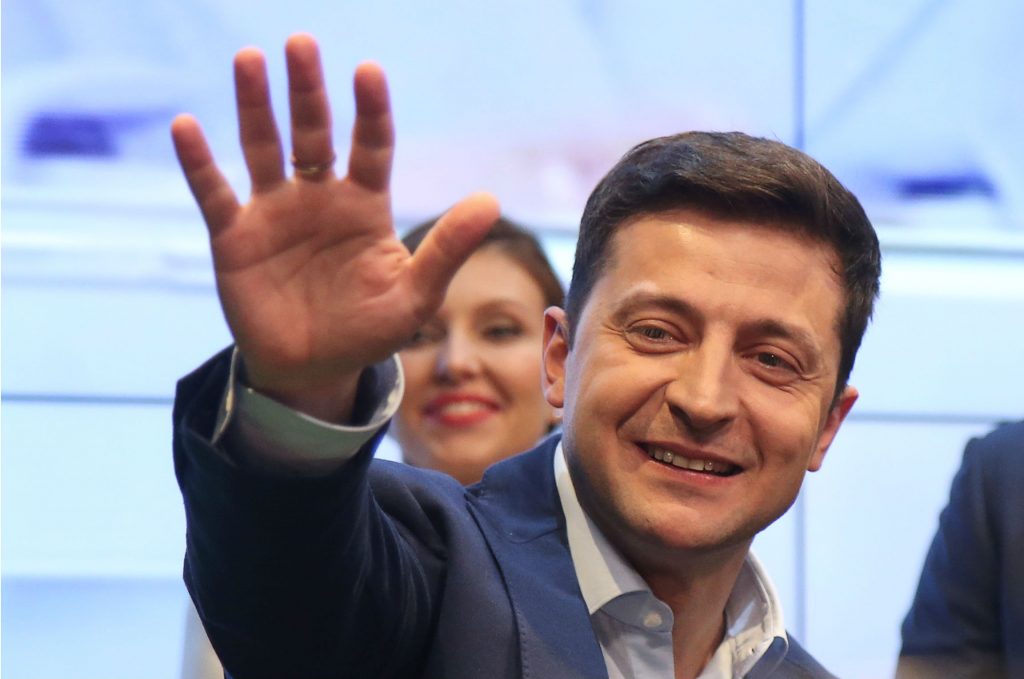Volodymyr Zelenskiy, elected to Ukraine’s presidency Sunday in a landslide, may be one of the least prepared leaders to head a democracy in world history. Not only is he an outsider, whose main experience of politics has been to play a president in a satirical television program, he has done little to prepare for the job.
In the months before and after he announced his quest for Ukraine’s highest office, he eschewed direct contact with voters at campaign rallies, ignored sustained, serious dialogue with civic and business organizations, and generally evaded journalists. Instead, until the waning days of the campaign, he appeared in his comedy variety show on air and live around the country and spent a great deal of time finetuning and filming his comedy TV series, “Servant of the People.” Today, he has established no clear lines of authority and has presented an earnest but weak team of expert advisers, only several of whom have government experience and most of whom have had only occasional access to him. He is surrounded by politically inexperienced groups of influence that represent his show business colleagues, members of his comedy troupe, corporate lawyers, and allies of oligarch Ihor Kolomoisky.
As was the case with President Donald Trump, outsiders and non-politicians frequently rely on their business entourage and their own instincts to populate their administration in their first days in office. And they often make major personnel mistakes right away. The turnover and delays in key appointments created policy paralysis in the Trump administration’s early days. But they were mitigated by the fact that Trump benefited from a network of experienced Republican technocrats and ideologues, including many with corporate or military experience. And he had some backing and intellectual support from a major established political party, think tanks, and an array of foreign policy, national security, and economic policy experts, and seasoned administrators.
Zelenskiy has virtually none of these advantages. And this represents both a grave danger and a major opportunity for a country under attack by Russia with seven percent of its territory occupied.
Most importantly, Zelenskiy has no knowledge or expertise on national security and foreign policy issues, no team of experts in these spheres of presidential competence, and no network of established international contacts that are characteristic of most business executives, politicians, celebrities, military officials and civic leaders who come to power as outsiders.
In short, like Blanche Dubois, Zelenskiy will now be required to “[depend] on the kindness of strangers.” But in Ukraine strangers often come with known or hidden benefactors and powerful interest groups that will seek to capture him for their own narrow ends.
The most important challenge will be for the West and pragmatic reformers to assist Zelenskiy in making important choices about cadres and preparing a detailed plan for his first 100 days in power. However, Zelenskiy’s lack of familiarity with the exercise of political power—coupled with the uncertain role some in his inner circle, including his politically inexperienced comedy partners and managers, a wealthy former aide to a Yanukovych-era head of the customs union who headed Zelenskiy’s regional outreach, and associates of exiled oligarch Kolomoisky—raises alarm bells and points to significant potential problems.
Zelenskiy is likely to be wary of overeager newcomers. But he can also be misled and manipulated by people in his inner circle. To prevent this, the president-elect should announce a transparent transition process with clearly delineated working groups, each headed by a team leader. These can be an interface for outside experts and ideas. Like most of Europe, Ukraine does not have an organized transition process. But in the case of a political neophyte, an orderly process for transition—akin to that of the United States—is much needed. It should include national security briefings from Ukraine’s defense, internal, and foreign affairs ministries and intelligence agencies to prepare the ground for the president’s assumption of power. Such a process and coherent team could also organize a set of briefings from outside international experts in the areas of diplomacy, defense, and national security. Zelenskiy would be benefit from moving quickly to establish a rapport with Prime Minister Volodymyr Groisman, who will be an important steady hand as Zelenskiy gets his political sea legs.
The ball is in the president-elect’s court. But if he is game, he can create a systematic process to use the knowledge of Ukraine’s civil society, technocratic reformers, a new generation of enlightened entrepreneurial business leaders, and the Ukrainian, American, Canadian, and European policy communities to help him succeed.
Adrian Karatnycky is a senior fellow at the Atlantic Council and managing partner of Myrmidon Group LLC.
Image: Ukrainian presidential candidate Volodymyr Zelenskiy waves to supporters following the announcement of the first exit poll in a presidential election at his campaign headquarters in Kyiv, Ukraine April 21, 2019. REUTERS/Viacheslav Ratynskyi
